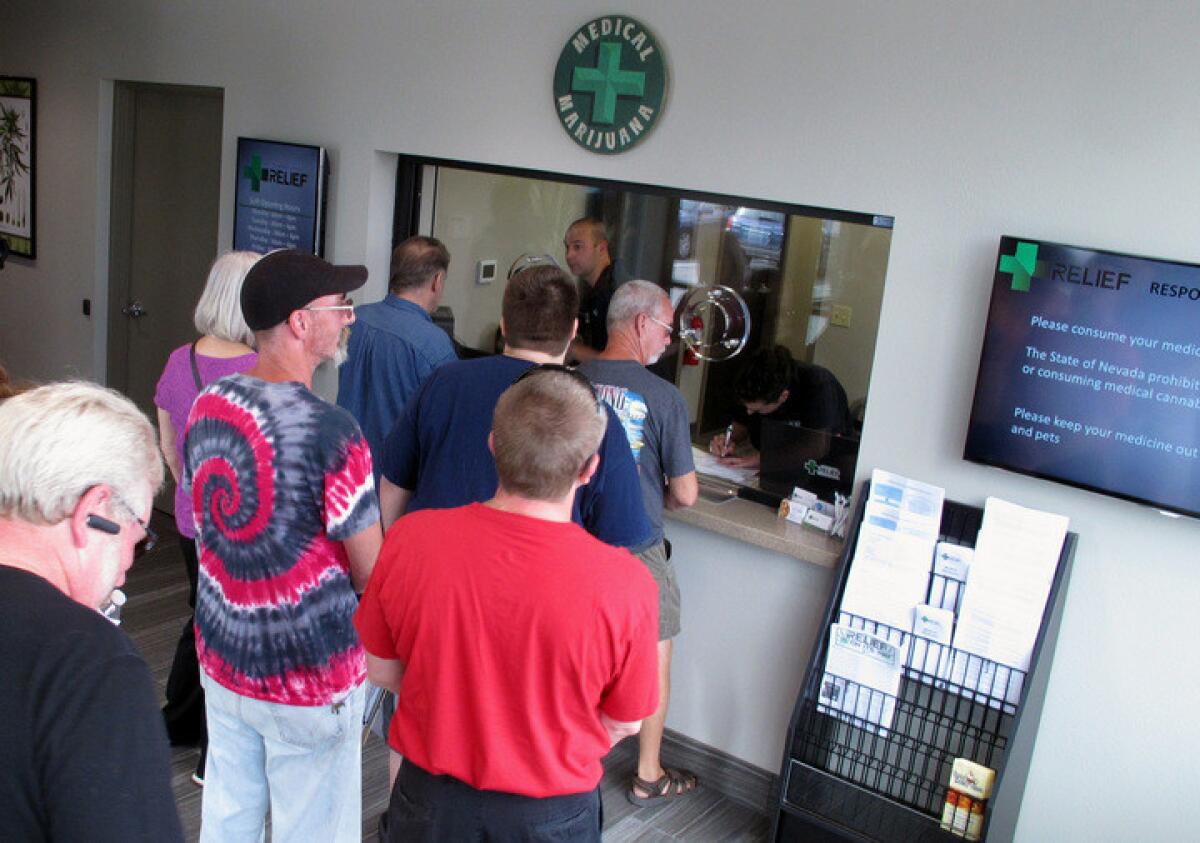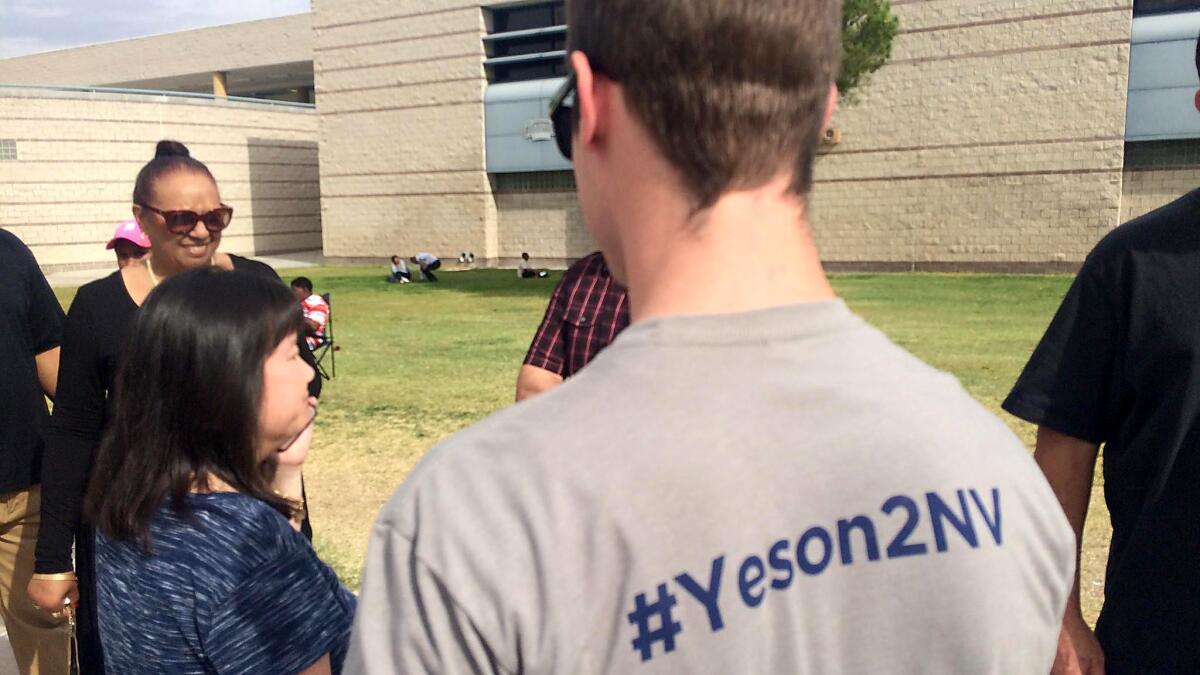Pot is popular among Clinton’s natural constituencies in Nevada, but she’s quiet on whether to legalize it

Reporting from LAS VEGAS — Christina Rourke flashed a grin and folded the flier handed to her promoting a Nevada ballot question allowing legal marijuana sales.
“Already voted for it,” Rourke, 32, who works in real estate, said on a recent afternoon as she stood in a line wrapping around a Las Vegas-area high school where President Obama was to campaign for Hillary Clinton. “Really, it was a big reason for me to even get out and vote. … Pot was big for me. Then came Hillary.”
Public approval of legal marijuana is accelerating, similar to the country’s quick evolution in favor of same-sex marriage. Efforts to legalize pot for recreational use are on the ballot in five states this month, including two battlegrounds — Nevada and Arizona — that Clinton is targeting in the final days of the presidential race. And though its proponents are wooing some of the same constituencies she is, Clinton is keeping the issue at a distance from her campaign, frustrating backers of legal pot who want her endorsement and running the risk of leaving votes on the table.
“Pot is Clinton’s ally, whether her campaign wants to admit it or not — it just is,” said Joe Brezny, a spokesman for the proponents of Question 2, Nevada’s pot measure. “We have the coalition she needs and they’re showing up to the polls to vote for marijuana reform.”
Indeed, in early voting totals in Nevada, Democrats are far outpacing Republicans in turnout. Another ballot question, which would require background checks on gun sales, has also energized younger voters and progressives.
While Clinton, trailing Donald Trump by about 2 percentage points in an average of polls in Nevada, stands to benefit from the enthusiasm forged by legalized pot here — surveys have consistently shown Democrats are more likely to back legalization — she has not publicly endorsed it. Trump has said the issue should be left up to the states.
During a Democratic debate in Las Vegas last year, Clinton sidestepped a question about legalizing marijuana in Nevada, saying more research must be done from studying implementation in states where it is legal, such as Colorado and Oregon.
Clinton has instead dispatched her primary challenger, Vermont Sen. Bernie Sanders, who supports the measure and now backs her, to campaign in Nevada in recent weeks. He has talked about pot during his appearances, and his political organization, Our Revolution, has sent emails urging supporters to vote for the measure.
But for some young voters, it’s not enough to have Sanders talk about marijuana reform. They want Clinton, who has said she never smoked pot and whose husband famously claimed he “didn’t inhale,” to publicly take a position.
“I’ll already be there voting yes for pot legalization, but I’m not completely sold on Clinton,” Spenser Sullivan, 22, an international-business major and volunteer for the proponents of Question 2, said last week as he sat at at a concrete picnic table outside Lied Library, near the core of the University of Nevada, Las Vegas, campus.
I’ll already be there voting yes for pot legalization, but I’m not completely sold on Clinton.
— Spenser Sullivan, a student volunteer
Deuvall Dorsey, a graduate student at UNLV and the student coordinator for the pro pot effort, said if Clinton wants his vote, she needs to take a stance.
“It’s sad because marijuana reform is so widely supported,” Dorsey, noting the millions in tax revenue that could come from legal sales in Nevada, said. “It’s what the people want.”
Clinton’s campaign did not respond to a request for comment.
Dorsey said he’s considering voting for Libertarian nominee Gary Johnson, who has said he smokes marijuana.
“But man, he’s not going to win. I’m not really down for a symbolic vote,” Dorsey said as he handed out postcard-sized fliers to students scurrying to class on the arid landscaped campus. “For me though, it’s all about getting pot passed.”
Clinton’s views in closed-door meetings appear to show she’s more definitively opposed to legal marijuana than the wait-and-see approach she advocated at that debate. In transcripts of speeches she gave to Fortune 500 companies, obtained and posted by WikiLeaks, Clinton voiced disapproval for legal marijuana during a question-and-answer session with Xerox CEO Ursula Burns in March 2014.
Still, some pot proponents see Clinton’s public comments as a positive.

“Her rhetoric is non-intervening in what states are doing and that’s all we need to keep the ball moving down the field and in the correct direction,” said Rob Kampia, executive director of the Marijuana Policy Project, a group dedicated to ending cannabis prohibition.
Polls show Question 2 with an advantage among Nevadans, but opponents, bankrolled by $2 million last month from casino magnate Sheldon Adelson, are making a late push. They’re airing television ads highlighting dangers of edible marijuana.
Proponents have been on the air with television ads for months, spending about $800,000. Similar to measures on the ballot in other states, including California, they tout tax revenue from legal pot sales that would go toward, among other things, public education.
They are also blanketing college campuses, concert halls and happy hours, urging young people to vote in support of reform. Outside the high school where Obama spoke, Dorsey handed out fliers to those in line.
“It only seems natural, with legalization happening so often now, that a future president would be in support of it,” said Brandon Monson, 28, an education major at the College of Southern Nevada, as he took a flier.
Monson noted his own displeasure that Clinton has not come out in support of pot.
“But maybe she’ll come around,” he said.
For more political news follow @kurtisalee
ALSO:
The polls might seem wild right now, but this election is closing a lot like the last one did
What the WikiLeaks emails tell us about Hillary Clinton’s campaign (and what they don’t)
More to Read
Get the L.A. Times Politics newsletter
Deeply reported insights into legislation, politics and policy from Sacramento, Washington and beyond. In your inbox three times per week.
You may occasionally receive promotional content from the Los Angeles Times.











